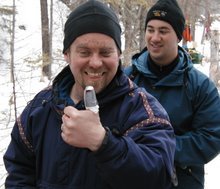I'm back in writing/directing mode after two months of teaching the world to sing. My children's history show, Quonnie: The Musical 2012, opens in less than two weeks! Once again I've written the script and lyrics myself, borrowing melodies from many different musical eras. I like writing lyrics and sometimes I'm really pleased, which makes up for the other times. "The Last Time I Saw Paris" was written by Oscar Hammerstein II and affectionately recalled the City of Light before the Nazi occupation. I used it in Quonnie: The Musical to provide a sentimental look at life in my neck of the woods back in September 1938, when Quonochontaug, RI (and the rest of New England) was devastated by a hurricane.
This year I have a couple of sweet elementary-age girls crooning the lyrics, which describe Quonnie before and after the storm: "The last time I saw Quonnie/the berries tasted sweet/the blush was on the roses red, we complained about the heat." The line I am proudest of incorporates a well known phrase: "The houses floated out to sea, the shoreline narrowed thin/our gardens drowned in ocean salt, a world gone with the wind." I meant it to refer to the song, which came out in 1937, but it could easily bring to mind the movie, which debuted in 1939. (And really, is there any better opening title sequence than this? ;)) To me it's a perfect visual image of how the hurricane affected this area.
I'm also proud of a lyric I dreamed up on the fly, Saturday night around 6pm. I was preparing to sing "Anything You Can Do, I Can Do Better" from Irving Berlin's Annie Get Your Gun. The original lyrics describe Annie's rivalry with Frank Butler, but my duet partner was Ben Hutto, the esteemed director of choirs at the National Cathedral School and St. Alban's School in Washington, DC. So, I started rewriting some lyrics to reflect our roles as music director and vocal coach at the Royal School of Church Music's Newport course. I scribbled out lines and showed them to Ben for approval. Some were clunkers, but some were good: "I sing music that'r make a window shatter," "I can stick my tongue out and sometimes stick my lung out." My very favorite will only be understandable to church musicians, but they'll howl: "I can Phos Hilaron with my underwear on." He delivered it perfectly and brought down the house.
Okay, then. YOU try to rhyme Phos Hilaron, wise guy.





















